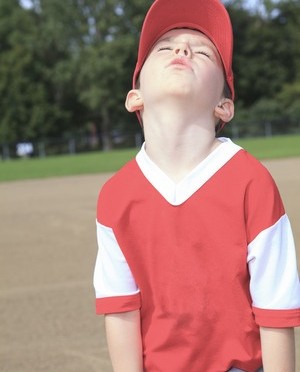Kids Playing Dirt in the Outfield?
We have a phrase for being in the outfield, it’s called “Working the Dirt” because when you’re in the outfield, you are effectively “out” in the “field.” If you were a planet, you’d be Pluto. The outfield is far away, and trying to feel connected to the game is a challenge for anyone, much less little league players who are very much part of our ever distracted modern culture.
Why Does the Outfield “Suck”?
Kids are squirmy, they want to move, and they want to feel important, seen and occupied. Younger divisions just don’t see a lot of action out there, and it’s hard not to feel left out and bored. It can be lonely, and it can be daunting!
If a coach isn’t paying attention, the kids can feel stuck out on the astral plane, picking their noses and paying attention to their new cleats, or their hat, or anything BUT the game. We don’t want that!
Redefine “Action”
Your outfielders need to understand that even if they are the furthest away from the diamond, they need to be in their proper place at the proper time. They can’t be just playing dirt in the outfield or wander off to pick dandelions on the field whenever they feel like it.
“Action” doesn’t mean you’re always doing something with the ball, it means you are, at all times, ready to attack the ball at any moment. “Really cool awesome throws” do not happen if you’re not in the place you need to be to grab that ball and do the “really cool awesome throw!” Waiting and paying attention is part of action, and while less glorious, it’s the subtle nuances in baseball that are pretty much more important than anything else.
Being an Outfielder is to BRING IT
If you have an outfielder who thinks the position is a demotion or not important, it’s time to nip that kind of thinking right in the bud. An outfielder can do nothing for an hour and then suddenly become the hero or the curse of an entire game in one catch or miss! There’s no position that’s quite as “all or nothing” as left, center or right field.
Show them some videos of the most insane MLB moments of grandiose saves, burly throws, and legendary pop fly catches. You can also show them some of the famous bloopers that happen from over-anticipating where the ball will go, hilarious collisions between outfielders and embarrassing mistakes that have been recorded for posterity, much to the chagrin of some of baseball’s finest professionals.
None of these guys, no matter what the outcome, is not giving it his all. If you’re an outfielder, you have to be able to hustle and throw like a boss. The fundamentals and mechanics of targeting long throws, keeping the feet moving, and fielding any ball in any direction is what makes outfielders the pride and joy of a great team. If you’re an outfielder, the coach thinks you’re all that and a bag of chips, it is NOT where the coach tries to hide less skilled players. Tell your outfielders that they are walking in the footsteps of history’s greatest right, left and center fielders: Ted Williams, Willie Mays, Mickey Mantle, Hank Aaron, Joe DiMaggio and Babe Ruth!
Dole Out Praise Like Penny Candy
Penny candy costs… duh… a penny. Your praise should be coming out of your mouth like roiling water from the river’s origin. Be generous with your praise, do whatever you can to enthuse and engage the entire team, but especially those outfielders.
You’ve got to praise them after just about every play, and even during practices. If they’re good at hustling, give’ em a nickname like “Lightening Feet!” and shout stuff like “There goes Lightening Feet, way to hustle, good job!”
Catch Them Being Good!
If they’re in the correct position, tell them they rock!
If they back up bases for other players, tell them they are kicking butt!
Freak out when they catch fly balls, holler a whoop when they get a grounder!
It’s the little things that an outfielder needs to catch to excel at the position, and remember that the younger they are, the more difficult it is for them to focus. Help them focus by noticing them all the time.
Be Prepared
If an outfielder has a mantra, it is “be prepared.” Teach your young-uns to focus for merely three seconds at a time. Show your older players how to develop mental routines for those long summer games. Every age is different, with varying capacity to understand what makes being an outfielder a desired position in the sport. Being prepared for a team’s propensity for stealing, hitting, running and bunting is a great way to stay engaged.

